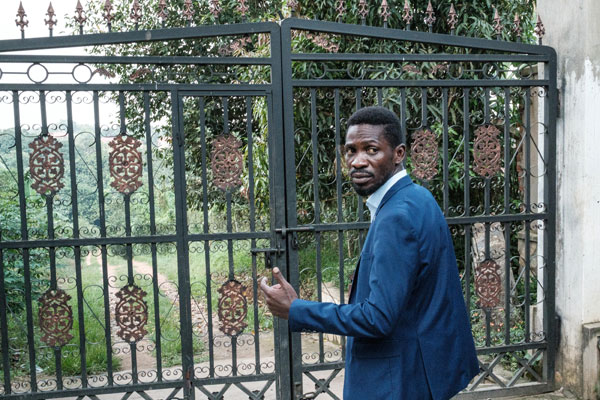EU decries harassment of Opposition, activists

Presidential candidate Robert Kyagulanyi, also known as Bobi Wine, explains to media how uniformed personnel entered through a gate of his home in Magere, Uganda, on January 15, 2021.
What you need to know:
- Mr Borrel also urged government to respect the freedom of expression and the right to peaceful and safe assembly, including the free movement of all political actors and their supporters.
The European Union (EU) yesterday expressed concern over continued harassment of political actors and some sections of civil society following President Museveni’s re-election in last Thursday’s polls.
In a statement from Brussels, the EU High Representative, Mr Josep Borell, appealed to government to observe rule of law.
“In line with its laws, international commitments and obligations, the government must ensure that security services act with restraint, that any violations or abuses are duly and impartially investigated, and that those responsible are held to account,” the statement read in part.
Mr Borrel also urged government to respect the freedom of expression and the right to peaceful and safe assembly, including the free movement of all political actors and their supporters.
President Museveni was declared winner of the election with 58.64 percent followed by National Unity Platform’s Robert Kyagulanyi, alias Bobi Wine, with 34 per cent.
Mr Kyagulanyi has been placed under house arrest and his home surrounded by the military and police.
Several election observer missions noted that the polling day was largely peaceful but avoided qualifying the elections as free and fair.
Meanwhile, Foreign Affairs minister Sam Kutesa yesterday briefed foreign diplomats accredited to Uganda on the situation after the polls.
Giving an account of the election activities, Mr Kutesa accused the Opposition of talking about Plan B to commit violent acts and insurgency, circumventing the democratic path.
“Why would a country that hold democratic values tolerate Plan B? Uganda will certainly not accept this because we are committed to democracy,” he said.
In August last year, Four-time presidential challenger Kizza Besigye said he had lost faith in elections as a means of changing government in Uganda and announced Plan B.
“I informed our leaders and activists that I will focus on “Plan B” as candidates focus on “Plan A”. Plan B is about fighting for our freedoms and our power,” Dr Besigye tweeted then.
Mr Kutesa also told diplomats that it is against the backdrop of Plan B that warranted deployment of the army around the capital and surrounding areas.
He defended the blockade of the Internet for five days so as to “stop spread of vitriol language and incitement to violence.”
Mr Kutesa also implored the diplomats to be “understanding” adding that government has sufficient capacity to deal with its affairs.




